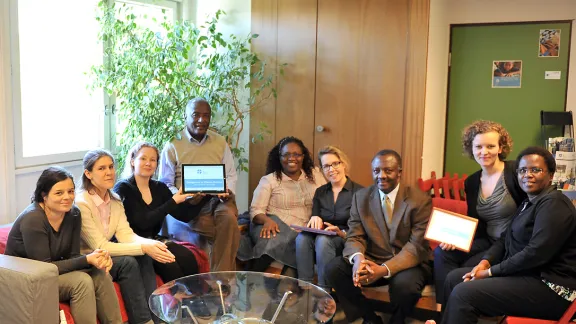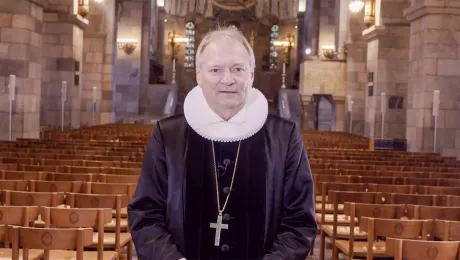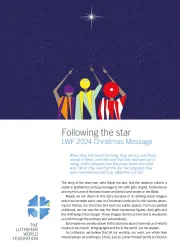
DMD staff facilitated the LWF online conferences, aimed at highlighting diakonia as an important part of Lutheran church identity. Photo: LWF/S. Gallay
Good practices and challenges in project management
(LWI) – Responsible management of staff and financial resources in institutions across the Lutheran communion empowers communities to fight social and economic injustices.
It also affirms the ability of churches to make change in the public sphere.
A virtual conference of The Lutheran World Federation (LWF) attended by participants from 72 countries heard about a variety of community projects, known as diakonia.
In Jerusalem, church-run schools offer qualitative and inclusive education. In India, advocacy by Dalit women has improved community access to basic services. From Nigeria, a beneficiary of an international study scholarship created a local sponsorship scheme targeting even more needy students. Elsewhere, churches continue to mobilize community action to mitigate the impact of climate change.
Organized by the LWF Department for Mission and Development (DMD), the conference included 16 video presentations on how to strengthen management capacity by providing opportunity and space for mutual learning and the sharing of experience among practitioners in the varied contexts of the LWF member churches. The nearly 200 people who visited the conference website took part in mutual conversation. Over 300 questions and comments were submitted.
Clear tasks and goals
“I am so inspired by hearing your thoughtful sharing about the use of our resources in meaningful ways,” remarked Rev. James San Aung, of the Myanmar Lutheran Church. He emphasized the need for churches to have concrete plans for theological seminary graduates so that churches can benefit from the skills gained.
A responsible steward or manager focuses on others. The tasks and goals must be clear, and he or she must allow other people who are involved to execute their tasks.
Aung was responding to a presentation by LWF consultant Prof. William O. Ogara who exemplified the “heart of diakonia” in the case of a medical graduate who received a LWF scholarship at a time when he was “broken, bruised and battered.” In return, the newly-trained doctor offered bursaries to two children in primary school, one in secondary school, and another at the university. That student eventually graduated.
In his keynote presentation on the theological dimensions of good management, DMD director Rev. Dr Fidon Mwombeki discussed the biblical account of Joseph’s dedicated accountability to Pharaoh and his commitment to manage grain for the sake of the people (Genesis 41). “A responsible steward or manager focuses on others. The tasks and goals must be clear, and he or she must allow other people who are involved to execute their tasks.”
Mwombeki said it was important to have competent people who can deliver on the tasks at hand. “The position we get is not just for us, it belongs to the church, the people and the community we serve,” he added.
Access to information
Language and access to information on good practice are key challenges to facilitating learning from the different actors in the delivery of social services by churches.
“Language is an important mechanism of participation for all people,” remarked Cibele Kuss, who works with 60 networks of the Lutheran Foundation of Diakonia, which addresses domestic and social violence, indigenous rights and food insecurity in Brazil.
Dinesh Suna, from the World Council of Churches, pointed out the strong connection between planning, monitoring, evaluation and reporting. “These cannot be done in isolation but are interlinked as one leads to the other.”
A holistic approach
From Jerusalem, where the Evangelical Lutheran Church in Jordan and the Holy Land runs primary and secondary schools, Dr Charlie Haddad talked about holistic education that concentrates on all aspects of a child’s development. This includes a co-educational approach to promote healthy gender interaction, and enrollment that reaches out to children with learning difficulties.
One of the sessions focused on Christians’ concern for the global climate crisis. Dr Per Ivar Våje, Church of Norway, said “we justify our involvement from our faith, it becomes fundamental. Care for creation should be a part of our basic value systems.”
From the Evangelical Lutheran Church in Guyana, Thamesha Watson, noted that “the foremost reason we care for the environment is because God commanded us as Christians to do so. As believers, we know that this is just a temporary world and eternal paradise waits us.”
The recent virtual conference builds on two previous ones held in June 2013 and September 2014. More than 1,000 diaconal practitioners and other participants from all world regions have followed the global online discussions, aimed at highlighting diakonia as an important part of Lutheran church identity.


